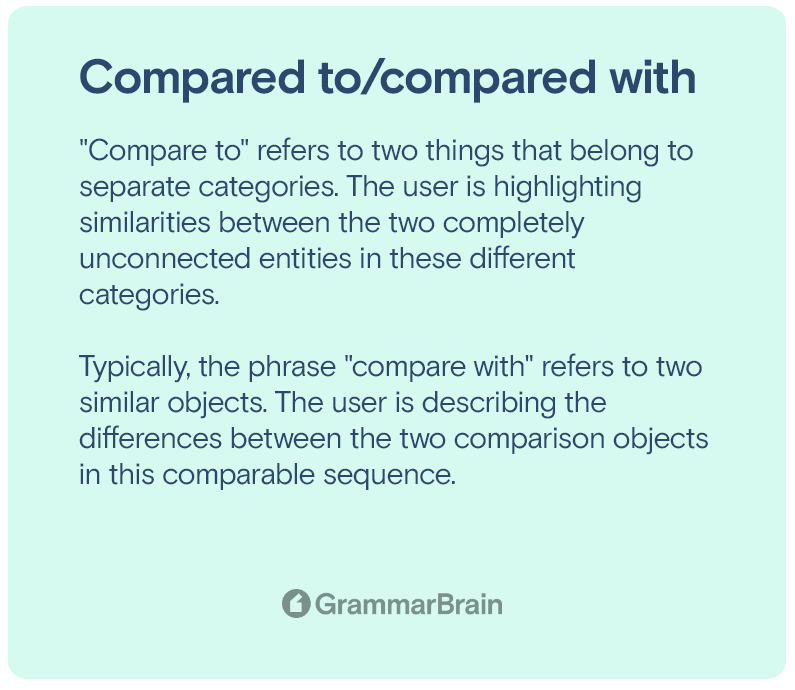Is it compared to or compared with? Compare refers to assessing or searching for dissimilarities between two or more objects. Users can use “with” or “to” both with “compare,” but there is a small difference between them.
In this article, you’ll find the definition of “compare to” and “compare with,” example sentences, and also a short discussion about compared to vs compared with.

“Compare to” vs. “compare with” definitions
“Compare to” refers to two things that belong to separate categories. The user is highlighting similarities between the two completely unconnected entities in these different categories.
Typically, the phrase “compare with” refers to two similar objects. The user is describing the differences between the two comparison objects in this comparable sequence.
| Word | Definition |
| Compared to | measured or judged against (something else) |
| Compared with (in comparison) | to judge, suggest, or consider that something is similar |
Example Sentences
Here are some example sentences with compare to and compare with:
- It demonstrated the conditions during the 2000–2004 American West drought compared to those during the medieval mega-droughts.
- He was a mess compared to his brother.
- Alice compared me to John and hurt my feelings.
- The young puppies were compared to the kids playing and fighting in the garden.
- By 2021, significantly more people could manage less money compared to a year ago.
- This snowfall is nothing compared to what they had last week.
- The assignment today was simple compared with the previous one.
- I compared my feelings for you with my feelings for him.
- Compared with her mother, Debbie is shorter.
- The Asians are not punctual compared with the Americans.
- Yesterday my aunt compared me with my sister Rosie.
- Hess Corp., a producer of natural gas and oil, posted a loss compared with a profit in the previous year when it claimed after-tax earnings of $1.24 billion on asset sales.
“Compared To” vs. “Compared With”
The differences between “compared with” and “compared to” is slight but important. The term “compared with” emphasizes how different two items are and also the resemblance between two completely different items. “Compared to” does the opposite. It shows the similarity between two objects.
When to use “compared to”
When comparing two objects that are not related or equivalent, you can use “compare to.” For example, Matt compared Debbie’s eyes to the ocean’s depths.
Here, the preposition “to” highlights a similarity between two items that aren’t exactly alike. The ocean is a sea, but eyes are bodily organs in humans. Even though they are entirely different things, something qualifies them for comparison. The color is what ties these two things together.
The color of the eyes, which are as dark as the ocean’s depths, is present in this context. “Depth” is a common characteristic here. “Depth” describes the exceedingly dark tint or color of “her eyes” and deep waters where only darkness reigns. Consequently, the comparison is being made between two different items that share a characteristic.
When to use “compared with”
When comparing two comparable or similar-looking things, users employ the term “compare with.” For instance, Alice and John sung the same song. Alice’s song and the song of the original vocalist John were contrasted.
In this instance, the preposition “with” highlights the similarities between two different objects. Two distinct singers perform the same song, which contrasts with one another. The song serves as the common element here.
You may also use “compare with” to highlight both similarities and differences. The song in the illustration above has been sung by two different singers, yet it is the same tune.
As a result, the quality of the voice and singing vary from one another.
Inside this article
Fact checked:
Content is rigorously reviewed by a team of qualified and experienced fact checkers. Fact checkers review articles for factual accuracy, relevance, and timeliness. Learn more.
Core lessons
Glossary
- Abstract Noun
- Accusative Case
- Anecdote
- Antonym
- Active Sentence
- Adverb
- Adjective
- Allegory
- Alliteration
- Adjective Clause
- Adjective Phrase
- Ampersand
- Anastrophe
- Adverbial Clause
- Appositive Phrase
- Clause
- Compound Adjective
- Complex Sentence
- Compound Words
- Compound Predicate
- Common Noun
- Comparative Adjective
- Comparative and Superlative
- Compound Noun
- Compound Subject
- Compound Sentence
- Copular Verb
- Collective Noun
- Colloquialism
- Conciseness
- Consonance
- Conditional
- Concrete Noun
- Conjunction
- Conjugation
- Conditional Sentence
- Comma Splice
- Correlative Conjunction
- Coordinating Conjunction
- Coordinate Adjective
- Cumulative Adjective
- Dative Case
- Determiner
- Declarative Sentence
- Declarative Statement
- Direct Object Pronoun
- Direct Object
- Diction
- Diphthong
- Dangling Modifier
- Demonstrative Pronoun
- Demonstrative Adjective
- Direct Characterization
- Definite Article
- Doublespeak
- False Dilemma Fallacy
- Future Perfect Progressive
- Future Simple
- Future Perfect Continuous
- Future Perfect
- First Conditional
- Irregular Adjective
- Irregular Verb
- Imperative Sentence
- Indefinite Article
- Intransitive Verb
- Introductory Phrase
- Indefinite Pronoun
- Indirect Characterization
- Interrogative Sentence
- Intensive Pronoun
- Inanimate Object
- Indefinite Tense
- Infinitive Phrase
- Interjection
- Intensifier
- Infinitive
- Indicative Mood
- Participle
- Parallelism
- Prepositional Phrase
- Past Simple Tense
- Past Continuous Tense
- Past Perfect Tense
- Past Progressive Tense
- Present Simple Tense
- Present Perfect Tense
- Personal Pronoun
- Personification
- Persuasive Writing
- Parallel Structure
- Phrasal Verb
- Predicate Adjective
- Predicate Nominative
- Phonetic Language
- Plural Noun
- Punctuation
- Punctuation Marks
- Preposition
- Preposition of Place
- Parts of Speech
- Possessive Adjective
- Possessive Determiner
- Possessive Case
- Possessive Noun
- Proper Adjective
- Proper Noun
- Present Participle
- Prefix
- Predicate



